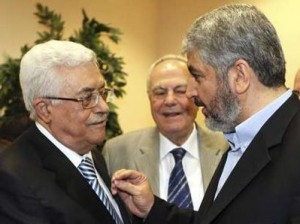Palestine Feature: Secrecy, Intermediaries, and Deals --- How Fatah and Hamas Reconciled (Fisk)
 Mahmoud Abbas and Khaled MeshaalRobert Fisk writes for The Independent of London:
Mahmoud Abbas and Khaled MeshaalRobert Fisk writes for The Independent of London:
Secret meetings between Palestinian intermediaries, Egyptian intelligence officials, the Turkish foreign minister, Palestinian President Mahmoud Abbas and Hamas leader Khaled Meshaal --- the latter requiring a covert journey to Damascus with a detour round the rebellious city of Deraa --- brought about the Palestinian unity which has so disturbed both Israelis and the American government. Fatah and Hamas ended four years of conflict in May with an agreement that is crucial to the Paslestinian demand for a state.
A series of detailed letters, accepted by all sides, of which The Independent has copies, show just how complex the negotiations were; Hamas also sought --- and received --- the support of Syrian President Bachar al-Assad, the country’s vice president Farouk al-Sharaa and its foreign minister, Walid Moallem. Among the results was an agreement by Meshaal to end Hamas rocket attacks on Israel from Gaza --- since resistance would be the right only of the state --- and agreement that a future Palestinian state be based on Israel’s 1967 borders.
In three years, members of the Palestinian Forum made more than 12 trips to Damascus, Cairo, Gaza and Europe and a lot of initiatives were rejected. Masri and his colleagues dealt directly with Hamas’ Prime Minister Hanniyeh in Gaza. They took up the so-called "prisoner swap initiative" of Marwan Barghouti, a senior Fatah leader in an Israeli jail; then in the winds of the revolutions in Tunisia and Egypt, the youth of Palestine on 15 March demanded unity and an end to the rivalry of Fatah and Hamas. Israeli prime minister Benjamin Netanyahu had always refused to talk to Abbas on the grounds that the Palestinians were not united. On the 16th, he made a speech saying that he was “thinking of going to Gaza”. Masri, who was present, stood on a chair and clapped.
“I thought Hamas would answer in a positive way,” he recalls. “But in the first two or three days after Abbas’ speech, it gave a rather negative response. He had wanted an immediate election and no dialogue. Hamas did not appreciate this.” Abbas went off to Paris and Moscow --- to sulk, in the eyes of some of his associates. But the Forum did not give up.
“We wrote a document --- we said we would go to see the Egyptians, to congratulate them upon their revolution. So we had two meetings with the Egyptian head of intelligence, Khaled Orabi --- Orabi’s father was an army general at the time of King Farouk --- and we met Mohamed Ibrahim, an officer in the intelligence department.” Ibrahim’s father had won renown in the 1973 war when he captured the highest ranking Israeli officer in Sinai. The delegation also met Ibrahim’s deputies, Nadr Aser and Yassir Azawi.
“Without the goodwill of all sides, the help of the Egyptians and the acceptance of the Syrians --- and the desire of the Palestinians to unite after the start of the Arab Spring, we could not have done this,” one of the principal intermediaries, 75-year old Munib Masri, told me. It was Masri who helped to set up a ‘Palestinian Forum’ of independents after the Fatah-dominated Palestinian Authority and Hamas originally split after Hamas won an extraordinary election victory in 2006. “I thought the divisions that had opened up could be a catastrophe and we went for four years back and forth between the various parties,” Masri said. “Abu Mazen (Mahmoud Abbas) asked me several times to mediate. We opened meetings in the West Bank. We had people from Gaza. Everyone participated. We had a lot of capability.”

 Tuesday, June 7, 2011 at 9:08
Tuesday, June 7, 2011 at 9:08
Reader Comments